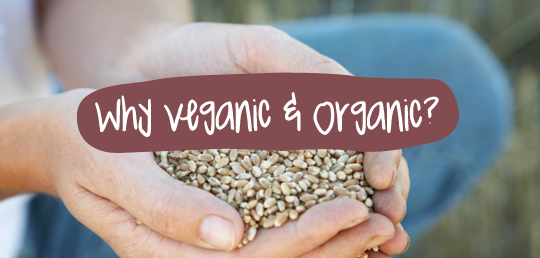Vegangstaz –
When it comes to agriculture, arguably the biggest buzzword of the last decade has been ‘organic’.
With the huge expansion in organic farming, organically grown crops no longer need to be sought out at specialised farmers markets or stores, and it’s now commonplace to walk into your local supermarket and alongside every vegetable comes its organic counterpart.
However, the word ‘organic’ has, to some extent, become a victim of its own success. With the huge hype around organic, people often choose to buy organic food (and now clothing) with little understanding of what that actually means other than ‘it’s a better option’.
There is a distinct irony in this: the modern organic movement originated in, essentially, a desire to reconnect with food – food that, over the last century, had become pumped full of chemicals and sprayed with pesticides and fertilisers. When I head to aisle 6 of 54 in my local supermarket to buy a pack of organic tomatoes that have been flown over from Portugal, I could not feel more disconnected from the food that I am buying.

This sense of reconnecting with food on a more personal level is not unfamiliar to vegans. Vegans often talk of the bizarre nature of food shopping today. It’s something we have all experienced – that walk down the meat aisle in a supermarket and the realisation that every piece of cellophane-wrapped piece of flesh around you used to be a part of an animal is a bewildering experience.
Omnivores feel it too – for many that is the very start of their journey towards vegetarianism. It’s that point where you reconnect.
Vegan organic/veganic/stockfree organic farming is a sub-movement within the organic food movement. It aims to reestablish that connection with nature and food once again. Organic food is supposed to be clean – veganic farming therefore sticks to the principles of avoiding pesticide and chemical fertiliser usage.
However, it takes this a step further. Veganic farm disallows the use of any animal byproducts whatsoever. Typical organic fertilisers include animal waste (manure and urea), other animal byproducts such as eggshells, blood, bone, and even animal remains.
The use of such products is abhorrent to both vegans and supporters of a true organic food movement.
The former, for obvious reasons – animal byproducts are a no-go. Most larger scale organic farming operations will purchase the aforementioned animal fertilisers from slaughterhouses, which sell them as a byproduct.
As for the organic food movement, supporters of this should be concerned based on the sheer levels of hormones and steroids which are fed to these animals. These chemicals are rife within their byproducts, and thus are part of so-called ‘organic’ farms.

VeganOrganic.net is a UK-based charity supporting veganic farmers and their practices
Veganic farming utilises various other methods for its fertilisation.
‘Green manures’ are methods of developing the soil without animal waste. One such example is the growth of cloves and leguminous crops to positively affect the nitrogen content of the soil prior to other crops being grown in it.
The entire system of a veganic farm is finely tuned but effective. When the system is in place, crops thrive. There isn’t even a need for pesticides of any kind, as crops include flowers which provide a rich ecosystem to control pests.
This in turn also provides complete sustainability. Thus, the system is inherently linked to the green movement. The farmers are not having to rely on external requirements such as fertiliser from animals for crop growth (animals which are an integral part to a farming system which is hugely damaging to the environment). By keeping this finely tuned machine running, and using the land to maximum efficiency, crop yields from veganic farms are large and varied.
One Degree are one of the companies supporting the rise of veganic farming in the US. Citing the lack of transparency in the modern food chain, and the lack of guarantee that ‘organic’ necessarily means healthy food anymore, they ensure that every supplier that creates their foods uses veganic farming methods.
They get to know every farmer who works for them and the history of their farms. They ensure that their core values match the farmer’s, and that they know how every product has been grown and by whom. They trust every farmer who works for them.
And when it comes to the people who grow the food that you eat everyday, surely it makes sense to want to trust them too?
For a little more insight into one of those farms, check out Don Hlaydich in this video.
![]()
(c) Vegangstaz – Read entire story here.








